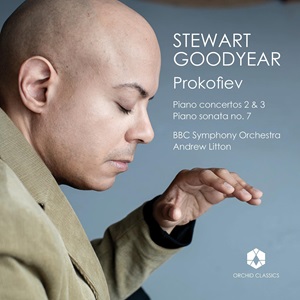
Sergei Prokofiev (1891–1953)
Piano Concerto No 2, Op 16 (1923)
Piano Concerto No 3, Op 26 (1921)
Piano Sonata No 7, Op 83 (1942)
Stewart Goodyear (piano)
BBC Symphony Orchestra/Andrew Litton
rec. 2024, BBC Maida Vale Studios, London, and Wyastone Concert Hall, Wyastone Leys, UK
Orchid Classics ORC100335 [75]
Prokofiev’s Piano Concerto No 2, long overshadowed by its immediate predecessor and successor, seems to finally be getting the recognition it deserves. This recording by Stewart Goodyear is the most recent; it follows Andrei Korobeinikov’s splendid interpretation, issued in 2022 by Fuga Libera (FUG 798). Goodyear and the BBC Symphony Orchestra, conducted by Andrew Litton, highlight the enfant terrible aspect of this concerto. Theirs is a muscular, square-jawed performance, brocaded by Goodyear with steely runs and pounding chords, and backed by an orchestra that pivots effortlessly between collaboration and disruption. Headlong energy, rising to the fore in the scherzo and finale, is the keynote here. Korobeinikov, joined by the Ural Philharmonic Orchestra and its conductor Dmitry Liss, take an antipodal approach that treats the concerto as a post-Rachmaninovian utterance, emphasizing its long-spun melodies and harmonic richness, while muting its spikiness. At times, as in the introduction, they convey a dreaminess that recalls the Prokofiev of the Violin Concerto No 1. Deciding which recording is “better” is a matter of personal taste—each has its virtues and listeners are richer for having both.
Competition runs a lot thicker in the Piano Concerto No 3 and Piano Sonata No 7 that make up the rest of this disc. Goodyear’s reading of the former keeps up with the best.
After a somewhat prosaic opening clarinet duet in the concerto, the performance is jolted to life by the entry of Goodyear, who pounces upon the rushing scales and castanet-accented dances with seemingly indefatigable athleticism. He glides along Prokofiev’s rapid shifts of mood with ease, as he shows in the central movement. Toughness alternates with vulnerability in the first and fourth variations; Goodyear’s pliant phrasing and sumptuous voicing in the latter conjure a late night, smoke-filled reverie, before Prokofiev directly sets him to race off again.
Bravado is pulled back in Goodyear’s playing of the Piano Sonata No 7, although its outer movements still crackle with vigor, animated further by the way he leans gleefully into their tone clusters and driving rhythms. The heart of his performance, however, is the “Andante caloroso”, which here has a Brahmsian warmth. That quality seeps into the finale, tempering the exultant self-confidence that typically characterizes the most memorable performances.
It reminded me of the similarly controlled recording by Shura Cherkassky (ICA Classics ICAC 5020), which capped a performance that one could describe as candied. There is a lot more sinew in Goodyear’s interpretation, but listeners seeking the abandon that Prokofiev surely intended in this proto-minimalist moto perpetuo should seek the recordings by Samson François (most recently re-issued on Warner Classics 0190295261863) and Tedd Joselson (Sony Classics 19075903272). Towering over both is Sviatoslav Richter (best heard either live on BBC Classics BBCL4265-2 or in the studio on Naxos Historical 8.111387), whose implacably ebullient reading of the finale exorcizes an entire epoch’s anxieties into a paroxysm of boundless triumph.
Néstor Castiglione
Buying this recording via a link below generates revenue for MWI and helps us keep free access to the site



















